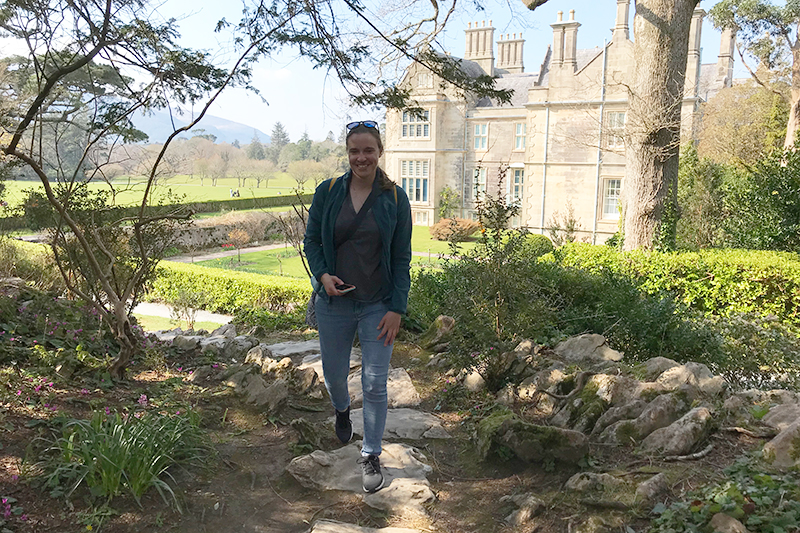


Dream job abroad
Photos courtesy of Danielle Egan October 04, 2024
Physical therapy alumna working dream job in Ireland
Danielle Olney Egan grew up on the ice. Her mother and nine siblings were of French-Canadian descent and played ice hockey. But Egan forged her own path and became a figure skater.
“Much to their dismay,” she laughed.
At 13, she suffered a stress fracture in her lower back that simultaneously sidelined her and inspired her future career. She began seeing a physical therapist (PT).
“I had a few PTs over the years, and as a teenager, their dedication impressed me,” she said. “I returned to the ice in four months, and a year-and-a-half later was at 100%, and I couldn’t have done it without them.”
She studied biology at Georgetown University and considered graduate school for physical therapy or sports medicine. Ultimately, the hands-on aspects of PT steered the Rhode Island native toward the University of Delaware’s top-ranked Doctor of Physical Therapy (DPT) program in the College of Health Sciences.
“I chose UDPT because of its reputation and because UD has a Figure Skating Team,” she said. “I did intercollegiate skating as an undergrad and wanted to continue as much as possible in graduate school.”
She went to nationals with the team her first year but had to step away her second year when clinicals picked up and brought her across the country.

“I knew I needed to step back and focus on what I was really here for,” she said.
Egan’s favorite rotation was an outpatient clinic in a small town in eastern Tennessee, working with high school football and basketball athletes.
“That experience really fed into my preparedness to work with young athletes in my career.”
She also enjoyed rotations in New Mexico and Idaho.
“For my rotations, I wanted to go as far away as possible to see different parts of the country and observe the differences in healthcare,” she said.
Egan graduated with her DPT in 2019, when a private practice in Idaho, where she had done a clinical rotation, asked her to return for a temporary assignment.
“Then, COVID hit,” she said.
She would remain in Idaho, working at a hospital-affiliated outpatient PT clinic for the next two years.
But without this perfect storm, she might never have met her now-husband, an engineer, who was also in Idaho on a work visa from Ireland.
Her Dream Job
As COVID restrictions eased, Egan and her partner Killian wanted a change of scenery. In the summer of 2022, they returned to his home country of Ireland and settled in Dublin. It took a year for Egan to get licensed by the Irish Society of Chartered Physiotherapists.
“During that year off, I used the skills UDPT taught me to read up on current research so that when I did return to work, I could hit the ground running with the latest research to adapt to different environments and patient populations.”
Once licensed, Egan landed her dream job at a private practice clinic, working with young athletes and people with hypermobility.
“Working with young athletes, including dancers and gymnasts, has always been my dream; it’s quite surreal,” she said. “I look forward to going to work every day.”
UDPT prepared her perfectly for the job.
“I was extremely confident right out of the gate and could see that I was well prepared to treat standard and more complex patients, and that’s definitely thanks to UDPT, the education, and the clinicals.”
On the job, she also quickly learned about the differences between PT in the U.S. and abroad. While healthcare in Ireland is funded by the government, physical therapy, or physiotherapy as it’s called in Ireland, at private clinics is primarily paid for out of pocket, and it gets costly.
“Instead of seeing someone one to three times a week, I might see them once every two to six weeks,” said Egan. “That’s been the hardest adjustment for me – making sure that people get the most out of their 30-60-minute session, so they feel prepared to work independently for the next month.”
People with chronic conditions visit every three to six weeks, which can change the course of treatment.
“Any manual therapy I might have implemented in their treatment in the U.S., they won’t get as much benefit from since they’re coming so infrequently,” said Egan. “So, PT is more exercise-based, which is the goal of PT anywhere in the long run.”
She also learned that in Ireland, patients don’t fill out as much paperwork before their initial consultation; instead, they walk through the door and tell you what’s wrong.
“Through the breadth of the curriculum, UDPT prepared me to be ready for whatever is thrown at you and to adapt and change depending on the scenario,” she said.
In the future
When you land your dream job at age 29, it’s hard to think about what’s next. Egan is content working in PT in Ireland and finds fulfillment in helping her patients.
While there are no year-round ice rinks in Ireland, Egan has found her niche in roller skating, which is more popular there.
“My boss gave me free rein to start a strength and conditioning class for roller skaters at the clinic, so that’s been an awesome opportunity.”
But she misses both UD and skating.
“As we travel around Europe, if there’s an ice rink, I’ll have my skates,” she said. “My entire life, I was able to skate five to seven days a week, and now, I go once a month, if that, so it makes me appreciate it a lot more.
“And as far as UDPT, I couldn’t have asked for a better education—it’s how I landed my dream job.”
Contact Us
Have a UDaily story idea?
Contact us at ocm@udel.edu
Members of the press
Contact us at 302-831-NEWS or visit the Media Relations website

